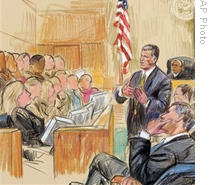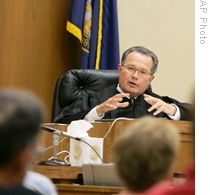2009-8-30
VOICE ONE:
Welcome to THIS IS AMERICA in VOA Special English. I'm Steve Ember.
VOICE TWO:
 |
| An artist's drawing shows a lawyer giving his closing arguments to the jury during a federal court case in Washington, D.C. in 2007. |
(MUSIC)
VOICE ONE:
A listener in Ulaanbaatar, Mongolia, Batmunkh Buyantogtokh, wants to learn more about American juries. For that, we visit a courtroom that looks much like the ones in movies and TV shows like "Law & Order."
We are in the Superior Court of the District of Columbia. The D.C. Superior Court is the general trial court for the city of Washington.
This is the fourth day in the case of a man accused of assault with a deadly weapon. We could not bring in a recorder, but the courtroom is mostly quiet except for the lawyers, witnesses and judge talking.
To the judge's right, along the side of the courtroom, is an area where twelve people are seated. In the front row is a man with glasses who looks old enough to be retired. A woman dressed like a young professional sits behind him, listening as a witness is questioned. A man also in his twenties or thirties rocks back in his seat. His hair is cut on both sides of his head; down the middle stands a mohawk.
These three and the other nine people are the members of the jury.
VOICE TWO:
Each day, thousands of Americans are called to serve on jury duty. The idea of citizens hearing legal arguments might date back to the ancient Greeks and Egyptians. But the modern trial by jury is a British tradition that colonists brought to North America centuries ago.
Laws on jury trials differ from state to state. But the United States Constitution guarantees the right to trial by jury. The Sixth Amendment establishes the right in all federal criminal cases. The Seventh Amendment gives the same right in civil cases that involve more than a small amount of money.
VOICE ONE:
The American system has three kinds of juries. The most common one is the petit jury. "Petit" -- p-e-t-i-t – comes from the French word for small. Petit juries can have as few as five or six members or as many as twelve. Twelve is traditionally the number in a criminal case.
Often a jury trial will last only a day or two. But some go for weeks or even months.
 |
| A judge at the Gage County Court in Beatrice, Nebraska, speaks to jurors during a murder trial last year. |
VOICE TWO:
The jury then deliberates. The members meet in private, choose a leader and try to agree on a judgment. Most states require all the jurors in a criminal case to agree on the verdict.
Sometimes a jury is unable to reach a verdict. This is called a hung jury. The judge declares a mistrial. Prosecutors then have to decide whether to try the case again.
Juries decide questions of fact; judges decide questions of law. A judge may overrule a jury's decision in some situations, but that is unusual. Decisions by judges and juries can be appealed to higher courts.
Juries rarely decide sentences. An exception is when a jury is asked to recommend either execution or life in prison in murder cases punishable by death.
(MUSIC)
VOICE ONE:
Under American law, a person is considered innocent until proven guilty. Also, there is constitutional protection against double jeopardy -- being put on trial twice for the same crime. In mistrials, though, prosecutors may retry a case until a jury reaches a verdict.
The verdict is either "guilty" or "not guilty." Jurors must find a defendant not guilty even if they are not completely sure the person is innocent of any crime. Jurors only need to have a "reasonable doubt" -- a reasonable question in their mind -- that the person is guilty as charged. This is true for criminal cases, but civil cases are different.
VOICE TWO:
Individuals and organizations can bring a lawsuit in court if they believe they have suffered a civil wrong. Many lawsuits are settled without a trial. But if a trial is held, jurors are not required to decide "beyond a reasonable doubt." They must decide only that there is enough evidence to support the accusations.
The jury might also award damages. The money could be the amount requested by the plaintiff, the one bringing the action. Or it could be less. Or it could be more, if the jury wants to punish the losing party and set an example for others.
VOICE ONE:
A grand jury is bigger than a petit jury. The United States has two kinds of grand juries. The charging grand jury decides if there is enough evidence to bring someone to trial. If the jury decides there is, then it returns an indictment.
The second kind is the investigative grand jury. Officials often call this kind of grand jury together in cases of organized crime or suspected corruption by public officials. The jurors are asked to approve efforts to gather evidence, often secretly, to build a case.
VOICE TWO:
Some investigations in the United States are heard by a coroner's jury. A coroner is a local medical examiner. The coroner usually calls six jurors to a hearing known as an inquest.
An inquest takes place when someone has died under suspicious or unknown conditions. The jury is asked to decide the cause of death.
(MUSIC)
VOICE ONE:
Courts choose people for jury duty from public records, like lists of voters or drivers. Some people are excused for health or family reasons, or because they cannot take time from work.
The judge and lawyers for both sides in a case question possible jurors. Lawyers try to choose those they think will be more sympathetic to their side. And they try to exclude those they think will be more sympathetic to the other side.
VOICE TWO:
Lawyers sometimes use experts to help them choose jurors. But jury consultants cost a lot more than most average defendants can afford.
In criminal cases, suspects who do not have enough money for a lawyer are given one free of charge to represent them. Critics of the criminal justice system, however, point out that public defenders are often overworked and underpaid.
(MUSIC)
VOICE ONE:
 |
| D.C. Superior Court Judge Melvin Wright says television shows like 'Law & Order' do not show trials the way they really happen. |
MELVIN WRIGHT: "I think people who watch T.V. get a false sense of what happens in real trials."
VOICE ONE:
Melvin Wright has been a judge for eleven years. He serves on the D.C. Superior Court. He says just choosing a jury even for the simplest trials can often take two or three hours.
VOICE ONE:
And he says programs like "CSI: Crime Scene Investigation" suggest that scientific evidence is used much more often than it really is. Judge Wright says the cost of gathering lots of scientific evidence can limit the use in real-life trials.
VOICE TWO:
In Washington, jurors receive thirty dollars a day for jury duty. Private employers are not required to pay workers for their time on a jury.
People called for jury duty at the D.C. Superior Court are asked to watch a video explaining the rules of jury service. They are asked to serve for either one day or one trial. If they are not chosen for a trial after a day, they are not required to return. The court provides child care for jurors with young children.
VOICE ONE:
Members of a jury can take notes during a trial. Some courts even let jurors ask questions. But there are supposed to be limits to how much information jurors may gather by themselves. Many courts are rewriting their rules to deal with the use of the Internet and mobile devices.
Judge Melvin Wright explains how the D.C. Superior Court handles this issue:
MELVIN WRIGHT: "We instruct jurors that they cannot during the course of a trial use Google or Twitter or any other electronic device to obtain information. Everything that they are supposed to learn has to come from inside the courtroom."
"The theory is this: If you talk to someone or you go to another source like Google to get information, you have gotten input from a source that the other jurors have not."
VOICE TWO:
Earlier this year, a judge in the state of Florida was forced to declare a mistrial after eight weeks in a federal drug case.
At first, one juror admitted to searching the Internet. But the judge questioned the remaining jurors and discovered that eight others had also gone online to research or discuss the case.
Jurors are not supposed to discuss a case with anyone else during a trial. But the rules are not easy to enforce when the jury goes home at night.
MELVIN WRIGHT: "There is no way we can monitor the activities of each juror twenty-four hours a day. So we have to have some trust that people will do what we tell them to do."
VOICE ONE:
American courts do most of their work without a jury. But legal experts say ninety percent of all jury trials in the world are in the United States. We asked Judge Melvin Wright what he considers the strengths and weaknesses of the American system.
MELVIN WRIGHT: "The criminal justice system relies on the testimony of persons and their ability to tell the truth. And sometimes people are honestly mistaken. Sometimes people come in and lie and people are convicted. So the system is not foolproof."
"But overall, it is in our view, the better system than anywhere else in the world because it gives average citizens an opportunity to listen to the evidence and make independent judgments the government is not part of."
(MUSIC)
VOICE TWO:
Our program was written and produced by Brianna Blake. I'm Barbara Klein.
VOICE ONE:
And I'm Steve Ember. To read and listen to our programs online, go to 51voa.com. Join us again next week for THIS IS AMERICA in VOA Special English.